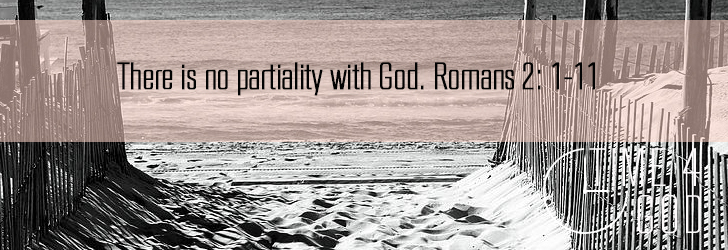No Partiality With God
How often are we guilty of judging others? We judge others most often from a position of pride, believing that we are somehow better than them, but this is wrong.

How often are we guilty of judging others? We judge others most often from a position of pride, believing that we are somehow better than them. The rhetoric of judgment can range from the cynically humorous, to angry, self-righteous, condemnation. How many times have we been in the company of others who judged someone negatively because of his or her race, color, creed, lanquage or tradition? How many times have we judged someone for their supposed failures, their inaction, their insensitivity, their intolerance? When we do this are we not also guilty of the same things? Paul tells us very clearly here in his letter to the Romans: “You, O man, are without excuse, every one of you who passes judgement. For by the standard by which you judge another you condemn yourself, since you, the judge, do the very same things.” (Rm. 2:1)
[content-ad]
We all pray the Lord’s Prayer, but do we think about what we are saying when we pray: “Forgive us our trespasses AS we forgive those who trespass against us.” Do we not tremble when we say that little word “as”? Do we not recognize the super-reality that it expresses? Do we not realize that God makes no distinctions? Sin is sin. If we do not repent and turn away from judging others, God “will [impartially] repay everyone according to his works…” (Rm. 2:6) To condemn another is not within our competence, that belongs to God alone. To judge is to sin. On the other hand, to forgive is to liberate and empower the other, as well as the self. That is what we are called by our Savior to do for one another. That is how we are to love one another.
Paul finishes this passage with these words: “There is no partiality with God.” (Rm. 2:10-11) There is the heart of the Gospel said in yet another way. We Christians say that we are forgiven and saved by Christ. We believe this with all of our being. But if we, then, turn around and judge others, condemning them for whatever reasons our ego’s can invent, we are acting in defiance of our own salvation. If we think we are better than others simply because we say we are Christian, and then judge and condemn all others who are not, on whose authority are we judging and condemning? Certainly not God’s. As Christians we believe in forgiveness. Why? Because we know that Christ died for our sins. Therefore, we also believe that we are called by the One who died for our sins, to do nothing less than that for others. If our hearts are not on fire with God’s love, if we cannot forgive, if we condemn even a single other human being out of anger or pride, how can we say that we love as Jesus loved? Do we not believe the word of God here in this passage: “Do you suppose, then, you who judge those who engage in such things and yet do them yourself, that you will escape the judgement of God?” (Rm. 2:3) Christians will be known most truly by their works. We must love as Jesus loved. We must have no partiality in us. For, if we have died in Christ, he will live in and through us. “There is no partiality with God.” (Rm. 2:11)
SKM: below-content placeholderWhizzco for FHB

